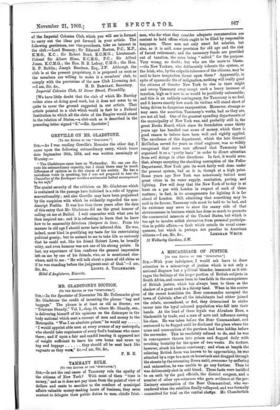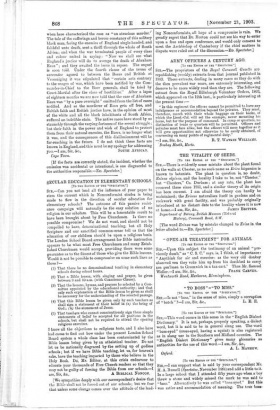A MISCARRIAGE OF jUSTICE.
[TO TUE EDITOR 0 Ir THE " SPROTATOIL1
Six,—With your indulgence, I would ask leave to draw attention to a miscarriage of justice which is not only a national disgrace but a pslitieal blunder, inasmuch as it out- rages the feelings of the larger portion of British subjects in South Africa, and causes them to lose faith in the omnipotence of British justice, which has always been to them as the shadow of a gteat rock in. a thirsty land. When in the course of the recent hostilities the Boer commandos occupied the town of Calvinia, after all the inhabitants had either joined the rebels, surrendered, or fled, they determined to strike terror into the loyal coloured population who fell into their hands. At the bead of these loyals was Abraham Esau, a blacksmith by trade, and a man of note and influence among his class. He was taken befaie the Boer Commandant, and sentenced to be flogged until he disclosed the place where the arms and ammunition of the garrison had been hidden before the surrender. This he resolutely refused to do, and he was in consequence thrown into prison and flogged daily with revolting brutality for the space of two weeks. No torture, however, shook his heroic constancy ; and when at length the relieving British force was known to be approaching, he, was attached by a rope to a man on horseback and dragged through the streets by the retreating Boers until, overcome by suffering and exhaustion, he was unable to go any further. Then he was deliberately shot in cold blood. These facts were testified to on oath by the gaol officials, the district surgeon, and a number of other eye-witnesses who gave evidence at the pre- liminary examination of the Boer Commandant, who sur- rendered when the rebellion finally collapsed, and was formally committed for trial on the capital chine. Mr. Chamberlain when here characterised the case as "an atrocious murder.'
The tale of the sufferings and heroic constancy of this solitary black man, facing the enemies of England single-handed, and
faithful unto death, sent a thrill through the whole of South Africa ; and when the war terminated people of every class and colour united in saying : "Now we shall see what England's justice will do to avenge the death of Abraham Esau " ; and they awaited the issue in repose. The sequel is soon told. Under the fourth clause of the terms of surrender agreed to between the Boers and British at Vereeniging it was stipulated that "certain acts contrary to the usages of war, which have been notified by the Com- mander-in-Chief to the Boer generals, shall be tried by Court-Martial after the close of hostilities." After a lapse of eighteen months we are now told that the case of Abraham Esau was "by a pure oversight" omitted from the list of cases notified. And so the murderer of Esau gets off free, and British faith and British justice have, in the opinion of mast of the white and all the black inhabitants of South Africa, suffered an indelible stain. The native races have stood by us staunchly through the varying fortunes of the recent struggle; but their faith in the power and wish of England to protect them from their natural enemies, the Boers, is no longer what it was, and the consequences of this disillusionment will be far-reaching in the future. I do not think these facts are known in England, and this must be my apology for addressing [If the facts are correctly stated, the incident, whether the omission was accidental or intentional, is one disgraceful to the authorities responsible.—ED. Spectator.]



























































 Previous page
Previous page